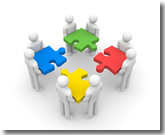 An outstanding board constantly evaluates itself and seeks out opportunities to build strength through ongoing development of skills and knowledge. Your board can engage in keeping up-to-date with effective practices, understanding the value of a board self-assessment and ensuring that they have an evolving understanding of ethical issues.
An outstanding board constantly evaluates itself and seeks out opportunities to build strength through ongoing development of skills and knowledge. Your board can engage in keeping up-to-date with effective practices, understanding the value of a board self-assessment and ensuring that they have an evolving understanding of ethical issues.
Becoming More Effective
Effective Practices
What does "high performance" really means for nonprofits? How do you get there from here? The Leap Ambassadors Community, a network of nonprofit leaders has developed clear, actionable answers to both questions.
Board room engagement can be made richer by the board routinely asking questions which prompt meaningful discussions and quickly get to the heart of the matter.
A basic understanding of the roles and responsibilities of the board is a good place to start in any recruitment and orientation activities
This resource briefly summarizes some of the key differences between Fiduciary, Strategic and Generative thinking in the boardroom.
Before the board meeting, you need to get some files to your board members for their review. Sending documents via email is not always the best way to accomplish this. This resource offers some tips for low/no cost sharing of files.
Boards of directors and boards of trustees are similar to other groups in that they go through various stages or phases of change. Certain aspects of each phase are critical to the successful development of the board and, therefore, the organization. Lee Bruder explores these phases and the key tasks of the board during each phase.
We never want to think about closing the doors, but this document will guide you through what that process entails.
Effective Board Meetings
Get immediate feedback from your board members about the meeting with this form that asks them to rate aspects of the meeting on a scale.
Keep this planning chart handy to jot down questions, issues and topics you feel deserve board thinking, input, strategy and decision making and use it when it is time to craft your next board agenda.
This sample board agenda is structured to promote less reporting and more strategic thinking.
Do your board meetings feel like a presentation of reports or a strategic discussion? Make sure your agenda sets the stage to best utilize the skills of the dynamic individuals who volunteer as board members.
An organization dashboard is a great way to organize financial information to present to your board and management team.
Let this template provide structure for your notetaking in meetings.
Use a sample agenda to prepare for your meeting.
Use a sample agenda to prepare for your meeting.
Board Chair Tips
Board room engagement can be made richer by the board routinely asking questions which prompt meaningful discussions and quickly get to the heart of the matter.
Get immediate feedback from your board members about the meeting with this form that asks them to rate aspects of the meeting on a scale.
Learn more about the who, what and why of executive sessions.
Use this organizer to prepare for your meeting and record items for the minutes.
Get immediate feedback from your board members about the meeting with this form that asks open-ended questions
Lee Bruder adapted this information to provide a concise checklist for the board chair.
This handout provides some ideas for developing your board recruitment program.
Use this list of financial questions as a guide to meeting your duty of financial oversight.
Review this quick checklist to determine if your board meetings are structured for effectiveness.
Board Self-Assessment
Share this frequently asked questions sheet with your board when they wonder why board self-assessment is important.
This tool allows board members to score their own individual performance on the board.
This survey is simple to complete and simple to score for board self-assessment.
Use this quick tool to get feedback from your board about their level of satisfaction with their role.
Here are some quick tips to set your board self-assessment process up to be successful.
This is a quick survey adapted from the work of Chuck Loring for the board to use for self-evaluation.
Governing with Integrity
Adapt this template for a whistleblower protection policy to meet your needs.
Prior to key decision making sessions in your boardroom, use this checklist to ensure that the board is ready to move forward.
Too often we think only of the types of conflicts of interests that involve financial gains. However, in the nonprofit sector it is perhaps more common to struggle with what are often called “conflicts of loyalty.” This document outlines some of these types of potential conflicts.
We never want to think about closing the doors, but this document will guide you through what that process entails.
This sample conflict of interest policy can be adapted to create your own.
Use this form yearly to remind board and staff to disclose any possible conflicts of interest.
Create or update your code of ethics policy using this sample.
Create or update your confidentiality policy using this sample.
Boardroom Discussions
Board room engagement can be made richer by the board routinely asking questions which prompt meaningful discussions and quickly get to the heart of the matter.
